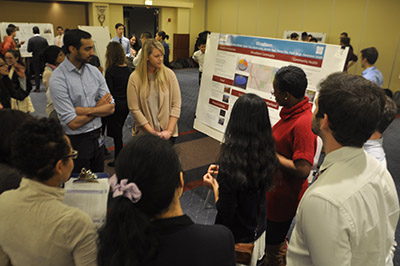
Taylor Sutcliffe, a first-year medical student, spent several weeks learning about the different health resources in the Uptown neighborhood of Chicago while working on her community health assessment project, a part of the Health & Society thread of Feinberg’s medical school curriculum.
“It’s eye-opening to see the different ways you can care for an individual more than just their physical health,” Sutcliffe said. “It’s important to keep in mind the different barriers or assets in the community your patient lives in, so you can serve as an advocate for them and know how to direct them to appropriate resources.”
Sutcliffe and her classmates went to Chicago’s diverse communities in groups to meet with representatives who guided them through a tour of the neighborhoods. They observed how people live, learn, play, worship and purchase food, in addition to learning what organizations in the community may affect the health of the neighborhood.
Sutcliffe’s group toured Uptown with a representative from the Cambodian Association of Illinois: there, they met monks at a Cambodian temple, the director of the Chinese Mutual Aid Association, and members from Apna Ghar, an organization the provides to services to immigrant women and children.
“The Cambodian temple was interesting because it isn’t a place I’d initially perceived as a health asset in the community, but they provide marital counseling, mental health counseling and other services that individuals in the Cambodian population wouldn’t necessarily seek medical care for at a health clinic or hospital, because of the way that those issues are perceived by members of that community,” Sutcliffe said.
Another health asset Sutcliffe observed in the community was the way health information was often disseminated – through nail salons.
“I found it a really interesting way to educate women on health information like the affordable health care act, through posting flyers and materials at nail salons to get information to a population that might not have access to it,” she said.
Once each student group gathered their information, they mapped the community’s health assets and presented what they learned at a poster session in November.
“This assignment required some ‘out of the box’ thinking because as health care providers, we typically are expected to figure out what is wrong and then decide what we need to fix the problem,” said Virginia Bishop, MD, MPH, assistant professor in Preventive Medicine and faculty coordinator of the project. “The approach was to discern all the things that were right and reflect on how these things may affect the health of the community. This proactive way of viewing resources supports the preventive theme of public health.”
Gabriel Weingart, a first-year medical student, did the community health assessment in the Lincoln Square neighborhood. His group found the neighborhood scored highly in areas that are important for good community health, such as access to nutrition, exercise and health care.
“It is one thing to read and talk about the health of a community, it’s another thing to go to the community, walk around it and see it for yourself,” Weingart said. “In the classroom you learn it’s good to have nice open spaces for exercise that are safe, but you go to certain communities that don’t have parks or you see abandoned parks in an unsafe community and realize that not everyone has access to these things.”






